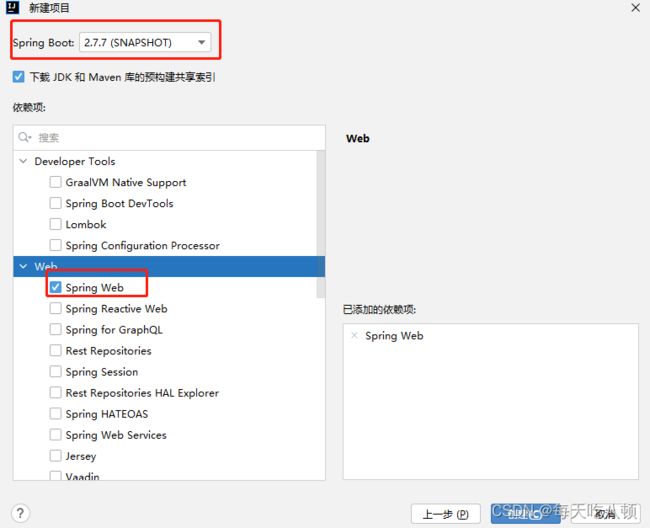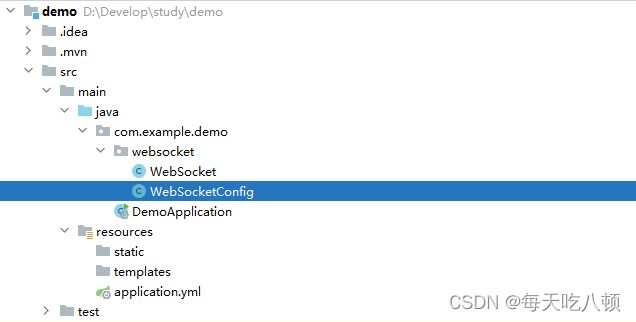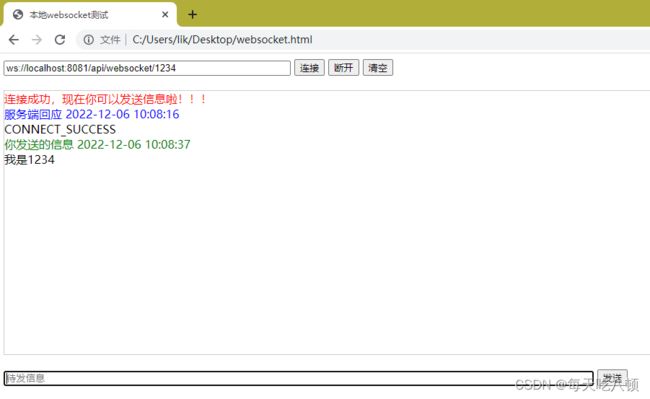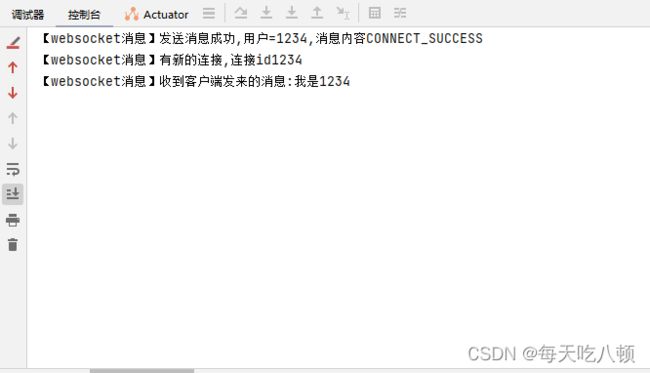SpringBoot实现WebSocket
一、什么是websocket
WebSocket是HTML5下一种新的协议(websocket协议本质上是一个基于tcp的协议)
它实现了浏览器与服务器全双工通信,能更好的节省服务器资源和带宽并达到实时通讯的目的
Websocket是一个持久化的协议
二、新建SpringBoot工程

按照上图这样配置即可,点击下一步
因为本文章只实现websocket功能,所以只勾选SpringWeb,同时要保证springboot版本要低于3.0

三、修改配置文件
将application.properties修改为application.yml,然后修改内容为
#服务器配置
server:
port: 8081
servlet:
context-path: /api
修改POM.xml,在dependencies下加入所需依赖,加入后在空白处右键点击重新加载项目,下载对应依赖
<dependency>
<groupId>org.springframework</groupId>
<artifactId>spring-websocket</artifactId>
<version>5.2.8.RELEASE</version>
</dependency>
<!--工具类 -->
<dependency>
<groupId>cn.hutool</groupId>
<artifactId>hutool-all</artifactId>
<version>5.4.1</version>
</dependency>
新建一个websocket包,包中新建两个类,代码如下
package com.example.demo.websocket;
import cn.hutool.json.JSONUtil;
import org.springframework.stereotype.Component;
import javax.websocket.OnClose;
import javax.websocket.OnMessage;
import javax.websocket.OnOpen;
import javax.websocket.Session;
import javax.websocket.server.PathParam;
import javax.websocket.server.ServerEndpoint;
import java.io.IOException;
import java.util.concurrent.ConcurrentHashMap;
@ServerEndpoint(value = "/websocket/{userId}")
@Component
public class WebSocket {
private static ConcurrentHashMap<String, WebSocket> webSocketMap = new ConcurrentHashMap<>();
//实例一个session,这个session是websocket的session
private Session session;
//新增一个方法用于主动向客户端发送消息
public static void sendMessage(Object message, String userId) {
WebSocket webSocket = webSocketMap.get(userId);
if (webSocket != null) {
try {
webSocket.session.getBasicRemote().sendText(JSONUtil.toJsonStr(message));
System.out.println("【websocket消息】发送消息成功,用户="+userId+",消息内容"+message.toString());
} catch (IOException e) {
e.printStackTrace();
}
}
}
public static ConcurrentHashMap<String, WebSocket> getWebSocketMap() {
return webSocketMap;
}
public static void setWebSocketMap(ConcurrentHashMap<String, WebSocket> webSocketMap) {
WebSocket.webSocketMap = webSocketMap;
}
//前端请求时一个websocket时
@OnOpen
public void onOpen(Session session, @PathParam("userId") String userId) {
this.session = session;
webSocketMap.put(userId, this);
sendMessage("CONNECT_SUCCESS", userId);
System.out.println("【websocket消息】有新的连接,连接id"+userId);
}
//前端关闭时一个websocket时
@OnClose
public void onClose() {
webSocketMap.remove(this);
System.out.println("【websocket消息】连接断开,总数:"+ webSocketMap.size());
}
//前端向后端发送消息
@OnMessage
public void onMessage(String message) {
if (!message.equals("ping")) {
System.out.println("【websocket消息】收到客户端发来的消息:"+message);
}
}
}
package com.example.demo.websocket;
import org.springframework.context.annotation.Bean;
import org.springframework.context.annotation.Configuration;
import org.springframework.web.socket.server.standard.ServerEndpointExporter;
//开启WebSocket的支持,并把该类注入到spring容器中
@Configuration
public class WebSocketConfig {
@Bean
public ServerEndpointExporter serverEndpointExporter() {
return new ServerEndpointExporter();
}
}
四、项目完整结构如下
五、测试功能
点击运行按钮,可以看到控制台对应的输出,输出看到JVM running for 表示启动成功

在桌面新建一个websocket.html,将代码复制进去
DOCTYPE html>
<html lang="en">
<head>
<meta charset="utf-8" />
<meta http-equiv="X-UA-Compatible" content="IE=edge">
<meta name="viewport" content="width=device-width, initial-scale=1">
<title>本地websocket测试title>
<meta name="robots" content="all" />
<meta name="keywords" content="本地,websocket,测试工具" />
<meta name="description" content="本地,websocket,测试工具" />
<style>
.btn-group{
display: inline-block;
}
style>
head>
<body>
<input type='text' value='通信地址, ws://开头..' class="form-control" style='width:390px;display:inline'
id='wsaddr' />
<div class="btn-group" >
<button type="button" class="btn btn-default" onclick='addsocket();'>连接button>
<button type="button" class="btn btn-default" onclick='closesocket();'>断开button>
<button type="button" class="btn btn-default" onclick='$("#wsaddr").val("")'>清空button>
div>
<div class="row">
<div id="output" style="border:1px solid #ccc;height:365px;overflow: auto;margin: 20px 0;">div>
<input type="text" id='message' class="form-control" style='width:810px' placeholder="待发信息" onkeydown="en(event);">
<span class="input-group-btn">
<button class="btn btn-default" type="button" onclick="doSend();">发送button>
span>
div>
div>
body>
<script src="https://code.jquery.com/jquery-3.1.1.min.js">script>
<script language="javascript" type="text/javascript">
function formatDate(now) {
var year = now.getFullYear();
var month = now.getMonth() + 1;
var date = now.getDate();
var hour = now.getHours();
var minute = now.getMinutes();
var second = now.getSeconds();
return year + "-" + (month = month < 10 ? ("0" + month) : month) + "-" + (date = date < 10 ? ("0" + date) : date) +
" " + (hour = hour < 10 ? ("0" + hour) : hour) + ":" + (minute = minute < 10 ? ("0" + minute) : minute) + ":" + (
second = second < 10 ? ("0" + second) : second);
}
var output;
var websocket;
function init() {
output = document.getElementById("output");
testWebSocket();
}
function addsocket() {
var wsaddr = $("#wsaddr").val();
if (wsaddr == '') {
alert("请填写websocket的地址");
return false;
}
StartWebSocket(wsaddr);
}
function closesocket() {
websocket.close();
}
function StartWebSocket(wsUri) {
websocket = new WebSocket(wsUri);
websocket.onopen = function(evt) {
onOpen(evt)
};
websocket.onclose = function(evt) {
onClose(evt)
};
websocket.onmessage = function(evt) {
onMessage(evt)
};
websocket.onerror = function(evt) {
onError(evt)
};
}
function onOpen(evt) {
writeToScreen("连接成功,现在你可以发送信息啦!!!");
}
function onClose(evt) {
writeToScreen("websocket连接已断开!!!");
websocket.close();
}
function onMessage(evt) {
writeToScreen('服务端回应 ' + formatDate(new Date()) + '
' +
evt.data + '');
}
function onError(evt) {
writeToScreen('发生错误: ' + evt.data);
}
function doSend() {
var message = $("#message").val();
if (message == '') {
alert("请先填写发送信息");
$("#message").focus();
return false;
}
if (typeof websocket === "undefined") {
alert("websocket还没有连接,或者连接失败,请检测");
return false;
}
if (websocket.readyState == 3) {
alert("websocket已经关闭,请重新连接");
return false;
}
console.log(websocket);
$("#message").val('');
writeToScreen('你发送的信息 ' + formatDate(new Date()) + '
' + message);
websocket.send(message);
}
function writeToScreen(message) {
var div = "";
var d = $("#output");
var d = d[0];
var doScroll = d.scrollTop == d.scrollHeight - d.clientHeight;
$("#output").append(div);
if (doScroll) {
d.scrollTop = d.scrollHeight - d.clientHeight;
}
}
function en(event) {
var evt = evt ? evt : (window.event ? window.event : null);
if (evt.keyCode == 13) {
doSend()
}
}
script>
html>
双击打开这个html文件,页面的功能如下,websocket的通信地址要以ws://开头,因为我的springboot启动在8081端口,所以我的地址就是 ws://localhost:8081/api/websocket/{连接id},websocket前面加了api是前面在yml文件中配置了context-path,没有配置可以去掉。实际项目中,将连接id换成唯一的用户id即可向指定用户发送消息。

到此,SpringBoot搭建WebSocket就已经完成,还有什么问题可以私信作者~




